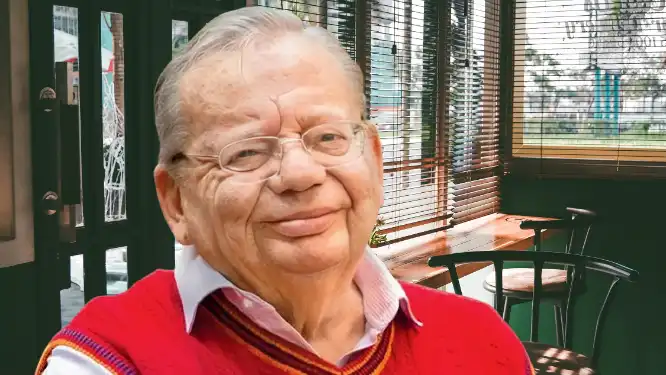Ruskin Bond
Ruskin Bond’s illustrious career spans more than six decades with over 500 short stories, essays, and novels. Born on May 19, 1934, in Kasauli, Himachal Pradesh, this celebrated Indian writer turns ordinary moments into extraordinary narratives that engage readers of all ages.
Bond made Mussoorie his home in 1963. The hill station became an integral part of his literary identity and inspired his writing deeply. His works often explore themes of nature, childhood, love, and loss. The Indian hills shaped many of these stories. His first novel “The Room on the Roof,” published at age 22, brought him initial fame.
CEO’s | Actors | Politicians | Sports Stars
Bond’s literary excellence earned him prestigious awards including the Sahitya Akademi Award, the Padma Shri, and the Padma Bhushan. His distinctive “slice-of-life” storytelling style features vivid sensory details that bring the natural world to life. Through his writing, Bond created beloved characters like Rusty and secured his place as one of India’s most treasured authors.

The early life that shaped Ruskin Bond
Growing up in the hills of Kasauli and Dehradun
The formative years of Ruskin Bond started in Kasauli, Himachal Pradesh. He was born there on May 19, 1934. His father, Aubrey Alexander Bond, was British and born in a military camp in Shahjahanpur. His mother, Edith Clarke, was Anglo-Indian. Young Ruskin and his sister Eldlen lived at Jamnagar palace until he turned six, where his father taught English to the princesses. Ruskin moved with his mother and sister to his maternal home in Dehradun after his father joined the Royal Air Force in 1939. The hill stations of northern India left a lasting impression on his writing. He developed a deep love for nature and the peaceful beauty of the mountains.
Losing his father and finding solace in books
The defining moment in Bond’s childhood happened around age eight when his parents split up. His father then brought him to New Delhi, where he served in the Royal Air Force. Bond later described 1942-1944 as “the best time of your life even if it is followed by sorrow and insecurity”. Father and son lived in several places around New Delhi – Hailey Road, Atul Grove Lane, and Scindia House. They created their own peaceful world filled with books, stamp collecting, music, and walks around Delhi, despite World War II raging on. His father would make breakfast before heading to office. He made his own butter and served “toasts with a half-boiled egg, occasionally a sausage, lots of jam, and lots of tea with condensed milk”. All the same, this happy time ended suddenly. His father died of malaria in Calcutta (now Kolkata) in 1944, leaving ten-year-old Ruskin heartbroken. Bond then returned to Dehradun to live with his mother and stepfather.
Discovering writing at Bishop Cotton School
The educational journey that shaped Bond as a writer began at Bishop Cotton School in Shimla. He studied there for eight years from 1943 to 1950. The school played a key role in developing his literary talents, though he wasn’t thrilled about boarding school life at first. Bond’s love for reading blossomed in the school library. He later became the library in-charge and earned a reputation as “quite a bookworm”. He excelled in humanities subjects like literature and history. Yet he openly admitted to having “a lifelong allergy for exams” and being “a complete flop as far as science and maths were concerned”. His writing talent shone through as he won several competitions, including the Irwin Divinity Prize and the Hailey Literature Prize. He wrote one of his first short stories, “Untouchable,” by age sixteen in 1951. Bond credited the school for his success: “I owe a lot to BCS, this is where I started my love of books and reading in the library and where I wrote my first short story”. These years coincided with India’s independence struggle. Seniors would patrol the dorms with rifles during the political unrest of the 1940s.
Mussoorie: The town that became his muse
Why Bond chose Mussoorie as his home
The practical decision Ruskin Bond made Mussoorie his permanent home in 1963 at age twenty-nine. His years of working in Delhi had left him tired of city life, and he longed for the peaceful mountains. “After four years, I was fed up with my job and of living in Delhi. I said I am going to go up to the hills and I am going to live entirely on my writing,” he explained. Practical reasons guided his choice of Mussoorie rather than romantic ones. “I knew the area, having grown up in (nearby) Dehradun and it was close to Delhi, where my publishers were. It was very cheap for a struggling writer in those days to live in the hills,” Bond revealed. Yes, it is worth noting that he found a home at Maplewood Lodge for just Rs 500 annually, which he called “ideal for a struggling writer”.
Landour and Ivy Cottage: The Ruskin Bond house
The iconic residence Ivy Cottage stands in Landour, a small cantonment town above Mussoorie. Bond moved to Mussoorie in 1963 but made Ivy Cottage his home in 1980. “The old building has been kind to me,” Bond once remarked about his dwelling. The cottage sits in a peaceful corner of Landour, far from Mussoorie’s bustling Mall Road. Bond’s bedroom windows overlook the road below, where he watches the world and weaves it into his stories. His home has become a landmark that draws devoted readers who hope to see their favorite author. Some visitors have spotted him feeding birds or tending to his potted plants near his distinctive D-shaped window. Bond shares Ivy Cottage with his adopted family, creating a private haven that has become part of literary history.
How the hills inspired his most famous stories
The natural splendor Mussoorie’s beauty has shaped Bond’s writing through the decades. “Living in the hills has shaped much of my writing. I write a lot about nature, birds, trees and that became more a part of my work after I came to live in the hills,” Bond acknowledged. His stories capture the region’s “berry-puckered scenery, snow-capped peaks, and hues of slow living”. To cite an instance, ‘A Short Monsoon Diary’ offers intimate glimpses of nature’s quiet miracles in Mussoorie – from monsoon’s arrival to the Cobra Lily waving from the pond and seasonal visitors like drongos and scarlet minivets. Bond has articulated his deep bond with the mountains: “It’s always the same with mountains. Once you have lived with them for any length of time, you belong to them. There is no escape”. His stories exceed their regional setting and achieve universal appeal. The mountains provide endless inspiration – “trees, rivers, forests, birds, animals, little villages, and simple people”. Bond’s observant eyes and lyrical prose have immortalized Mussoorie’s misty hills, colonial charm, and peaceful atmosphere, creating a literary landscape that enchants readers worldwide.
The quiet power of Ruskin Bond’s storytelling
Themes of nature, nostalgia, and childhood
Behind every page of Ruskin Bond’s work lies a mixture of recurring themes that have become his literary signature. Nature emerges as his most prominent muse, and his stories capture the subtle beauty of the Himalayan landscape—from rain-drenched hillsides to flowering valleys. His bond with the natural world runs deep and personal, as he once remarked, “The trees are my friends—the deodars, oaks, maples and pines”. Nostalgia spreads through his writing and gives readers glimpses into a simpler time of childhood adventures and bygone eras of Indian small-town life. Bond himself puts it, “It is always the same with memories. They fade, like photographs, like flowers pressed between the pages of a book”. Childhood’s innocence and wonder form the life-blood of his literary universe. Bond portrays children with remarkable authenticity and captures their curiosity, resilience, and unfiltered view of the world.
Simple language, deep emotions
The hallmark of Bond’s prose shows deceptive simplicity. His unadorned language carries profound emotional depth—a technique that makes his stories available yet meaningful. “I don’t like complicated novels. I try to write as clearly and simply as possible,” Bond once explained. His straightforward narrative style draws strength from vivid sensory details rather than elaborate words. Many of his stories unfold through first-person narratives and create an intimate connection between reader and storyteller. Critics describe his work as “slice-of-life” storytelling, where ordinary moments become extraordinary through his observant eye. Bond’s work shows remarkable restraint and lets emotions surface naturally from situations. “True literature should make you fall in love with the characters, sympathize with their problems, and feel their joys,” Bond believes. This emotional authenticity makes his stories stay with readers long after the last page.
Why his stories appeal across generations
The universal appeal of Ruskin Bond’s work breaks age barriers, making him beloved by both children and adults. His stories speak to fundamental human experiences—friendship, loss, discovery, and the search for meaning—that stay relevant whatever the time period. Bond’s characters feel like people we might know and face situations we might encounter. “I think readers identify with my characters and the simple problems they face,” Bond once noted. His honest portrayal of human relationships, especially the bonds between different generations, creates stories that touch diverse audiences. Bond’s work offers a refreshing alternative to our ever-changing modern life and invites readers to slow down and appreciate life’s small wonders. His gift for finding beauty in ordinary moments explains why new generations continue to find and embrace his work. One critic observed, “Bond doesn’t write about extraordinary people doing extraordinary things—he writes about ordinary people experiencing the extraordinary in everyday life”.
Rusty and beyond: Characters that live on
The semi-autobiographical Rusty series
Rusty stands as the cornerstone of Ruskin Bond’s literary universe and remains his most enduring character. Bond created Rusty at seventeen, introducing him in “The Room on the Roof,” which earned the John Llewellyn Rhys Memorial Prize in 1957. This 16-year-old Anglo-Indian orphan represents Bond’s own life experiences as he directs his path through Dehradun while living with his strict guardian John Harrison. Rusty’s story unfolds through several works including “Vagrants in the Valley,” “Rusty, the Boy from the Hills,” “Rusty Runs Away,” and numerous novels and short story collections. Readers follow his evolution from a confined, lonely boy who yearns for freedom to an independent young man who discovers his true self. His adventures mirror Bond’s personal experiences—from breaking free from confinement to embracing Indian culture through friendships he forms in local bazaars.
Other memorable characters in Ruskin Bond books
Bond’s literary world brims with characters who have captured readers’ hearts for decades. Mehmood from “The Kite Maker” stands out with his craftsmanship and pride in creating a dragon kite for the Nawab. Uncle Ken, Bond’s maternal uncle, brings joy to readers through stories like “At Sea with Uncle Ken,” with his misadventures—from crashing his car into walls to facing angry swarms of bees. Nakoo, the gentle crocodile from “Cricket for the Crocodile,” breaks away from typical crocodile stereotypes. Young Rakesh’s story in “The Cherry Tree” teaches valuable life lessons through his experience of growing and nurturing a cherry tree with basic care. These characters have gained such popularity that they inspired the television series “Ek Tha Rusty,” based on Bond’s semi-autobiographical work.
How his characters reflect real people and places
Bond’s characters ring true because of his sharp eye for observing real people. Many characters spring directly from his life—Rusty mirrors Bond’s experiences, while the recurring father figure represents Bond’s own father, Mr. A.A. Bond. Dukhi the gardener, who appears in stories like “A Job Well Done,” emerged from Bond’s childhood memories of his grandmother’s gardener. Bond believes that “character is not a state but a process”. His characters grow organically through their stories and change as they face various situations. Critics praise Bond’s creation of “round characters” instead of flat ones—complex individuals who blend both virtues and vices. This approach explains why his characters, though not headline-makers, shine through “their quiet heroism, their endearing idiosyncrasies, and their heartwarming ability to find happiness and contentment in everyday events”.

Image of Ruskin Bond
Legacy, love, and literary honors
Awards won by Ruskin Bond over the years
Throughout his career, Ruskin Bond got numerous prestigious accolades that recognized his exceptional contributions to literature. The celebrated author received the Sahitya Akademi Award in 1992 for “Our Trees Still Grow in Dehra”. The Government of India honored him with the Padma Shri in 1999 and later with the Padma Bhushan in 2014. On top of that, the Sahitya Akademi presented him with the Bal Sahitya Puraskar in 2012 for his most important contributions to children’s literature. The Sahitya Akademi Fellowship, their highest literary honor, became his in 2021. Bond’s humble perspective on these honors shines through his words: “It’s nice to have awards from time to time. There was a time when I had to make a living from my writing, and it wasn’t always easy. I value awards a lot – and more so if there is a little cash with them!”
His connection with readers and book signings
The heartwarming bond between the author and his audience shows in his frequent interactions with readers of all ages. Readers from young children to adults flock to meet their favorite author at book signings, like those at the STORY bookstore in Kolkata. Bond signs countless copies with patience and poses for photographs while “visitors jostled for a selfie with him”. He makes these moments special by having warm, grandfatherly chats and asking visitors about their hometown. His fame hasn’t changed his simple approach to writing. He once said: “If I were not a professional writer who was getting published I would still write”. The COVID-19 pandemic reduced his public appearances, yet he treasures connections with readers across generations, noting, “Sometimes I hear from people that their parents and even grandparents had read my work”.
Ruskin Bond quotes that capture his essence
The philosophical depth of Bond’s thinking lives in his memorable quotes that have inspired generations. His love for nature speaks through his words: “Live close to nature and you’ll never feel lonely. Don’t drive those sparrows out of your veranda; they won’t hack into your computer”. His mountain musings flow poetically: “It is always the same with mountains. Once you have lived with them for any length of time, you belong to them. There is no escape”. Bond’s wisdom about happiness rings true: “Happiness is a mysterious thing, to be found somewhere between too little and too much”. His literary philosophy reveals itself beautifully: “Nothing is insignificant; nothing is without consequence in the intricate web of life”. His gentle spirit shines in his thoughts about love: “The best kind of love is the one that comes quietly, without thunder or drama… and stays”.
The Timeless Appeal of Ruskin Bond’s Literary World
Ruskin Bond’s remarkable experience has created a literary legacy that started in the hills of Mussoorie and now reaches way beyond the reach and influence of geography. His exceptional way of turning everyday moments into compelling narratives has earned him a place among India’s most beloved authors. Bond’s works use simple prose to explore deep themes of nature, childhood, love, and loss. His carefully chosen words paint vivid sensory experiences that transport readers to misty hills, dewy mornings, and bustling bazaars of his world.
A Literary Beacon for Generations
Bond’s lasting influence touches people of all ages. Grandparents, parents, and children find solace and joy in his stories. His choice to make Mussoorie his home in 1963 changed not just his life but Indian literature itself. This hill station became the source of countless stories that captured the essence of simple living and natural beauty. His characters—especially the semi-autobiographical Rusty—strike a chord with readers because they reflect universal experiences of growth, discovery, and belonging. The Padma Bhushan and Sahitya Akademi Fellowship are just formal recognition of what readers have long shown through their steadfast dedication.
The Essence of Bond’s Literary Magic
The secret behind Ruskin Bond’s lasting appeal comes from his authenticity and gentle wisdom. His stories stay fresh and relevant even decades after their first publication. They offer a perfect escape from our complex and chaotic modern lives. Bond shows us that life’s true richness comes from our connections to nature, people, and ourselves. His stories are more than entertainment—they are quiet guides that help us live mindfully and appreciatively. As Bond might say, the best stories don’t need dramatic plots. They help us see the extraordinary in our everyday lives. At nearly 90 years old, Bond remains not just a celebrated author but a cherished friend whose words clarify the hidden beauty in our daily existence.
Books of Ruskin Bond
| Book Title | Description |
|---|---|
| The Blue Umbrella | A captivating story about a little girl who trades her lucky jewelry for a beautiful blue umbrella. |
| Room on the Roof | Follow the journey of Rusty, a seventeen-year-old orphan, as he finds friendship and a place to live. |
| Delhi Is Not Far | Explore the lives of ordinary yet unlucky characters in the dull town of Pipalnagar. |
| Rusty, the Boy from the Hills | Join Rusty as he experiences remarkable events during his childhood in pre-Independence Dehradun. |
| The Night Train at Deoli and Other Stories | Discover a collection of touching short stories set in Dehradun and Mussoorie. |
| Vagrants in the Valley | Embark on a journey of personal growth and friendship with Rusty in the Himalayan highlands. |
| A Book of Simple Living | Ruskin Bond’s personal diary capturing beautiful moments and the beauty of nature. |
| Funny Side Up | A charming read for all ages, filled with interesting characters and countryside magic. |
| Angry River | Experience Sita’s struggle to survive alone on an island as the angry river threatens to drown it. |
| A Season Of Ghosts | Get ready for spooky goosebumps with this collection of ghost stories set in the Himalayan mountains. |
| A Flight of Pigeons | Follow Ruth’s journey during the 1857 Indian Rebellion, filled with refuge-seeking and kidnapping. |
| Lone Fox Dancing | Ruskin Bond’s autobiography that uncovers his origins and life experiences from childhood to adulthood. |
| Falling in Love Again | Dive into a collection of passionate and warm love stories, capturing various phases of romance. |
| Death Under the Deodars | Explore bizarre cases and mysteries set in the Mussoorie of a bygone era. |
| Dust On The Mountain | Join a young boy’s journey from the hills to the city, exploring fascinating characters and nature. |
| The Sensualist | Engage in an erotic and introspective tale of self-destruction and the power of desire. |
| Tigers for Dinner | Listen to captivating stories told by a cook to Ruskin Bond, including encounters with wild animals. |
| The Perfect Murder | Unravel the story of two brothers plotting to inherit a property through a perfect murder. |
| All Roads Lead to Ganga | Experience Ruskin Bond’s nostalgia and love for the Himalayas through vivid travel memoirs. |
| Tales and Legends from India | Delve into a collection of Indian tales and legends divided into three sections for young readers. |
| The Hidden Pool | Join three friends on a risky and adventurous journey to the Pindari Glacier. |
| Another Day in Landour | A reflective memoir capturing everyday life and the beauty of Landour, Mussoorie. |
| Journeys to Remember | A collection of travel stories and experiences from Ruskin Bond’s life. |
| School’s Out! | A nostalgic look at childhood memories and school days in the hills. |
FAQ:
What are Ruskin Bond’s famous books?
Some of Ruskin Bond’s most famous books include The Room on the Roof, The Blue Umbrella, Rusty the Boy from the Hills, A Flight of Pigeons, and Our Trees Still Grow in Dehra.
What is Ruskin Bond’s age?
Ruskin Bond was born on May 19, 1934. As of June 2025, he is 91 years old.
What are the awards and achievements of Ruskin Bond?
Ruskin Bond has received several prestigious awards, including the Sahitya Akademi Award (1992), Padma Shri (1999), and Padma Bhushan (2014) for his contribution to literature.
Where does Ruskin Bond reside?
Ruskin Bond resides in Landour, near Mussoorie, Uttarakhand, India.
How was Ruskin Bond’s childhood?
Ruskin Bond spent his early childhood in Kasauli, Jamnagar, and Dehradun. He lost his father at a young age and was raised by his mother and stepfather.
Which Ruskin Bond books are good for kids?
Popular Ruskin Bond books for kids include The Blue Umbrella, The Cherry Tree, Grandfather’s Private Zoo, Crazy Times with Uncle Ken, and The Adventures of Rusty.
Who is Ruskin Bond’s wife?
Ruskin Bond has never married.
Who are Ruskin Bond’s family members?
Ruskin Bond was born to Edith Clarke and Aubrey Bond. He was raised by his mother and stepfather after his father’s death. He considers his adopted family in Mussoorie as his own.
What is Ruskin Bond’s educational background?
Ruskin Bond completed his schooling at Bishop Cotton School in Shimla, where he won several writing competitions.
Is Ruskin Bond Indian?
Yes, Ruskin Bond is Indian. He was born in India to British parents and has lived in India his entire life.
Is Ruskin Bond alive?
Yes, as of June 2025, Ruskin Bond is alive.





